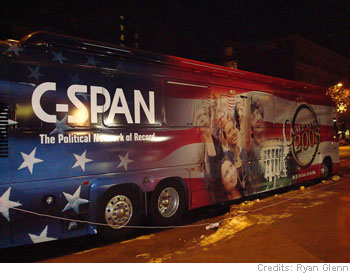 I’m old enough to remember the debates over whether to televise the House and Senate live. Most members of Congress favored increased exposure, but they all worried about unguarded moments or statements taken out of context and used against them in TV ads in the next campaign. Senator Russell Long (D-LA) was particularly eloquent and hilarious in 1986, when he rose in opposition saying as I best recall, “There will be times when a senator rises to say ‘Hi Grandma. Hi Grandpa. Everything’s fine.” Another senator asked, “Senator, are you implying that there are demagogues in the Senate!” Without blinking an eye, Long stormed back, “You’re damn right! There’s 100 of them, and if the Vice President’s around, there are 101!”
I’m old enough to remember the debates over whether to televise the House and Senate live. Most members of Congress favored increased exposure, but they all worried about unguarded moments or statements taken out of context and used against them in TV ads in the next campaign. Senator Russell Long (D-LA) was particularly eloquent and hilarious in 1986, when he rose in opposition saying as I best recall, “There will be times when a senator rises to say ‘Hi Grandma. Hi Grandpa. Everything’s fine.” Another senator asked, “Senator, are you implying that there are demagogues in the Senate!” Without blinking an eye, Long stormed back, “You’re damn right! There’s 100 of them, and if the Vice President’s around, there are 101!”
Tip O’Neill launched internal live television of the House floor using House camera crews in March, 1977, and two years later gave the public access through C-SPAN. The Senate followed in 1986 using its own camera crews. Up until then, only select hearings had been televised to riveted national audiences: the Senate organized crime hearings and Senator Joe McCarthy’s communist witch hunt hearings in the 1950s and the 1973 and 1974 Watergate hearings. The Museum of Broadcast Communications in Chicago has a concise history.
Over time, most hearings and mark-ups were televised and even some conference committees. We staff got used to having the backs of our heads on TV, and we cracked jokes about those staff who seemed to cross behind the chair too many times just to be seen from the front.
I also started attending more meetings behind closed doors to reach agreements that would be reenacted before the cameras the next day. It’s a lot more work to do everything twice, and sometimes the reenactment on camera didn’t go according to the script, so the chair would hastily recess to repair the damage.
Most of the time, I like the American people to see what Congress is doing, but in this age of instant media gratification, I know how misinformed the public can become based upon one sound bite that ignores a congressman’s who career doing the public’s business well.
I’ve also seen decorum decline to the point where one of the least scandal ridden presidents we’ve seen for a while got called a liar during his nationally televised address on health reform to a joint session of Congress on September 9, 2009. Check it out on Youtube. This is not good for the country.
There are also plenty of hearings which must be closed for national security reasons or because witnesses constitutional rights would be damaged.
I object to televising every utterance every minute of every closed door meeting because the meeting will be impaired. Human beings need interaction to try out ideas and to gauge support without being crucified for trying something that wasn’t adopted anyway. The more scrutiny beyond a reasonable amount, the less useful business gets done.
I know this is a futile plea, but let’s drop gotcha politics and debate the issues openly and fairly.
- Bulenox: Get 45% to 91% OFF ... Use Discount Code: UNO
- Risk Our Money Not Yours | Get 50% to 90% OFF ... Use Discount Code: MMBVBKSM
Disclaimer: This page contains affiliate links. If you choose to make a purchase after clicking a link, we may receive a commission at no additional cost to you. Thank you for your support!


Leave a Reply